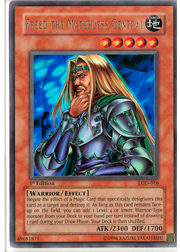 Every weekend after a Regional tournament in my area, I go to the local card shop and inquire about how everyone did. Invariably, I am assaulted with stories about opponents’ lucky topdecks. But more than that, I hear about how players missed their chances at making the Top 8 because they failed to realize that they could have done something else to win games. When I hear this, I usually ask the player in question how long he or she practiced with the deck before taking it to Regionals. The answer that I usually get is, “Practice? I built my deck the night before!”
Every weekend after a Regional tournament in my area, I go to the local card shop and inquire about how everyone did. Invariably, I am assaulted with stories about opponents’ lucky topdecks. But more than that, I hear about how players missed their chances at making the Top 8 because they failed to realize that they could have done something else to win games. When I hear this, I usually ask the player in question how long he or she practiced with the deck before taking it to Regionals. The answer that I usually get is, “Practice? I built my deck the night before!”
Many players don’t see anything wrong with building decks the night before a major tournament. In fact, some players have actually been moderately successful with decks constructed in this manner. The problem lies in the fact that one night is never enough time to learn everything that you need to know in order to be consistently successful with your deck. There’s no way that one all-night gaming session followed by two hours of sleep will prepare you for every reasonably possible scenario or matchup that you’ll face at the tournament, so why even try? It’s much easier to be successful at this game if you’re well rested and know exactly how to play your deck in any plausible situation.
How do you get ready for a major tournament? Playtesting. Playtesting is the number one thing that a large percentage of the duelist population doesn’t do. Playtesting is one of the main things that separates players like those on Team Comic Odyssey from duelists who go 0-2 drop at the Shonen Jump Championships. This begs the question, “How do I playtest successfully?” The first step is to grab a bunch of friends and teammates, and sit down wherever it is that you usually play. Card shops and kitchen tables are ideal for this purpose. Let it be known that it’s nearly impossible to playtest successfully on your own, so don’t skip this part.
The next thing to do is hold a massive brainstorming session. What does each person think the dominant decks will be at the tournament in question? Make sure to write down everything you think of, and pay special attention to the cards that are mentioned as key cards in the dominant decks—those are the cards that you’ll need to have answers for if you want to win a game against a particular deck. When you’ve finished the brainstorming session, take a couple of days off to prepare the deck that you want to play in the tournament.
After you have the initial version of your deck worked out, it’s time to go on the Internet to prepare your gauntlet. Take the list that you generated during brainstorming and scour the Internet for what you think are the best builds of the decks on that list. You’ll now want to build those decks to play against. Chances are that you’ll need to use proxies to do this successfully, because no one wants to buy tons of extra, expensive cards just for testing. Don’t worry—it’s okay to use proxies in this fashion as long as you don’t show up to a tournament with them in your deck.
Now, you and your friends need to get acquainted with the decks in your gauntlet. Each person should both play and play against each deck many times, including his or her own deck. Through these repetitions, you should begin to understand how each of the decks in the gauntlet works, what you have to do to beat the decks, and which cards in your deck will help you do that. While you’re playtesting, it’s a good idea to be lax with many of the rules you would normally follow. Try playing a few games open handed. If you or your opponent discovers that a specific card would wreck face in a particular match, feel free to “cheat” a bit and switch in that card in place of a card that’s useless to you. Advise your friends about any gameplay mistakes that they make, and help each other to make sure that no one makes any incredibly bad moves. You can use the data from these games to help you modify your deck.
If you find that certain cards are coming up as dead draws too often or are generally useless to you, drop them from your deck. Look over the list of cards that you swapped in during your matchups and play some games with those cards in your deck. Keep the generally useful cards in your deck and put any cards that are only useful against certain decks into your side deck. It won’t be difficult to find fifteen cards that are helpful to you against some, but not all decks.
At this point, you should be just about ready to take your deck to the major tournament of your choosing. However, before you go running off to the Shonen Jump Championships, you should take your carefully playtested deck and try it out at local tournaments. Make sure that you remember the difference between playtesting and actual competition. I’ve seen many people fall off the path to success because they were spoiled by the lax environment of in-group playtesting. It isn’t smart to expect an opponent in a real tournament to act like you’re just testing at home. Embarrassment will ensue if you screw up and then ask your opponent to let you take the move back.
Now you’re ready to head to the major tournament of your choice. Try to give the game a bit of a rest while you’re traveling to the tournament site, and try not to stay up too late the night before. Remember, staying up the night before does you no good if you find that you need to change something the next day.
On the day of the tournament, you should try to get there early and scout around a bit. If you see a lot of decks of the same type, you should modify your deck or side deck accordingly to include more of the cards that you know are good in that matchup. Similarly, if you see a total lack of something that you prepared for, make the appropriate adjustments.
 If you aren’t playing a surprise combo deck, try to play some of the locals to get a feel for the skill level and playing style of the area. Remember, people from different parts of the country often have different styles of play. Let’s say that you come from somewhere that is full of Warrior Swarm decks, and you think that you know how a Warrior deck works. Now, imagine going to an out-of-town Shonen Jump Championship and playing a local duelist whose Warrior deck includes Big Shield Guardna, Freed the Matchless General, and Command Knight. You may lose, but if you find out before the tournament begins that you need to make modifications to your deck, then it’s no loss at all.
If you aren’t playing a surprise combo deck, try to play some of the locals to get a feel for the skill level and playing style of the area. Remember, people from different parts of the country often have different styles of play. Let’s say that you come from somewhere that is full of Warrior Swarm decks, and you think that you know how a Warrior deck works. Now, imagine going to an out-of-town Shonen Jump Championship and playing a local duelist whose Warrior deck includes Big Shield Guardna, Freed the Matchless General, and Command Knight. You may lose, but if you find out before the tournament begins that you need to make modifications to your deck, then it’s no loss at all.
All that is left for you to do now is play your best and try to win your matches. It’s time for all of your hard work to pay off as you play your cards almost instinctively. If you’ve playtested successfully, you’ll have the advantage over foes with less foresight and can be on even footing with the best players in terms of preparation.
Next week, I’ll be starting a series of articles about the decks to beat in the new Advanced format. I hope that you’ll find my column useful in your playtesting. Until then, play hard, play fair, and most importantly, have fun!
Jerome McHale
jcmchale@andrew.cmu.edu